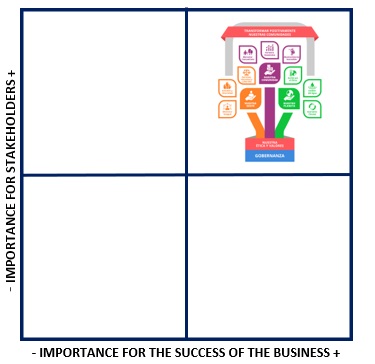Materiality Analysis
To define the priorities of the Sustainability Strategy and ensure that human and economic resources are being focused on the issues relevant to FEMSA’s Business Units and their stakeholders. During 2020 we began a materiality analysis process, a tool that aims to identify economic, environmental and social topics as well as risks and opportunities that are relevant to the organization and its stakeholders.
This analysis involved the investigation and analysis of external and internal factors, the prioritization of the relevant topics, as well as the validation of the pillars, priority topics and focus areas.
The results of this exercise help us to better understand our current impacts, redefine the way we want to operate in the future. It also allows us to align with our core values, policies and positions, identify material ESG (Environmental, Social and Governance) priorities and set goals and objectives.
![]()
Identification
In this step we define an integrated process, the premises or criteria for inclusion and the main drivers for performing the materiality analysis.
Besides updating the Policy, in the business strategy analysis, the need to include Sustainability concepts in FEMSA's mission and vision was determined.
In the analysis of internal processes, the documentation and internal processes that contain relevant elements related to Sustainability actions are reviewed.
In the analysis of legal requirements, legal requirements are identified to ensure regulatory compliance.
In the risk assessment, key corporate business risks and opportunities are identified through our internal risk framework.
In the analysis of best practices and global trends, information from 17 leading sustainability companies is compared.
In the identification of external stakeholders, dialogues are established with 24 of them to address Sustainability issues.
![]()
Prioritization
With the information derived from the previous step, it was possible to identify the relevant topics for FEMSA and its stakeholders. Nowadays, these topics are part of the Sustainability Strategy.
Our ethics and values
Our Governance
Our People
Our Community
Our Planet
Human and Labor Rights
Diversity and inclusion
Integral Wellbeing
Community Wellbeing
Economic Development
Sustainable Sourcing
Climate Action
Water Management
Circular Economy
01. Ensure Decent, Optimal and Safe Working Conditions
02. Prohibit Child and Forced Labor
03. Respectful And Collaborative Work Environments
04. Foster Inclusive Work Environments
05. Encourage Diversity
06. Promote Gender Equality
07. Promote a savings culture and financial education
08. Protect Physical, Mental and Emotional Health
09. Career Development and Continuous Learning
10. Promote Values and Citizenship
11. Promote Healthy Lifestyles
12. Contribute to Safe Surroundings
13. Clean Communities
14. Local Community Engagement
15. Economic, Financial, and Digital Inclusion
16. SME´s Development and Local Procurement
17. Encourage Entrepreneurship
18. Sustainable Sourcing
19. CO2 Emissions Reduction
20. Renewable Energy Use
21. Sustainable Mobility
22. Development Of Sustainable Products And Services
23. Optimize Water Efficiency
24. Contribute to Water Accessibility, Sanitation And Hygiene (WASH)
25. Contribute to Water Security
26. Reduction and Elimination of Operation Waste
27. Use and promotion of Sustainable Packaging
28. Product and Service Circularity
![]()
Validation
Determining the Sustainability Road map
Dialogues with Corporate and Business Unit directors to confirm that the priority topics are those of interest to FEMSA.
Dialogues with sustainability experts to validate the list of priority topics.
Dialogues with FEMSA collaborators to validate the focus areas identified.
The priority topics identified are of common relevance to FEMSA’s Business Units and it is determined that they can generate greater value and positive impact and develop a sufficient degree of maturity that allows them to currently be, or might be, agents of change.
We hope that by integrating these issues into our Sustainability Strategy, we will develop a competitive advantage and enable us to be a leader.
The focus areas are important to our stakeholders and we have identified that through our parnterships and alliances wecan work together to generate positive transformations on a larger scale.
Materiality Matrix

The focus areas are clearly reflected in the Sustainability Strategy and are a priority for the development of FEMSA’s businesses. Targets have been defined, programs and initiatives have been planned and indicators have been developed to assess sustainable performance and measure ourcontribution to the global Sustainability agenda.


